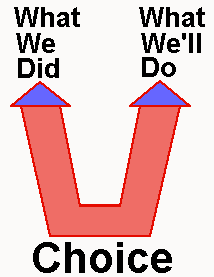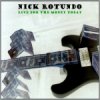![]()
Choice Is the Game Changer
I stand bewildered why, in a world where the operation side of radio has an objective of finding the least expensive way to accomplish less original content, we continue to read that the radio industry, online and off, expects clients and audience to accept its "more." For definition: "more" means more commercials and a higher cost of advertising. There's an insider's mindset that even with more choice of alternative audio sources, audience and advertisers will still choose the radio station.
Around 2002 I fought a new concept in ad sales introduced by Go.com - the purchase of search engine advertising based on response. That system soon spread to thousands of online ad networks and today can be found, literally, with any major internet ad vendor. By 2004 I became a believer in this cost-per-action (CPA) advertising and how it could help advertisers increase response rates, but by 2015 I had convinced no one in radio. Now I believe that, online, selling CPM is a formula for disaster. (I hope to have a better success rate conveying this thought.)
In 2005 I became deeply involved with the proliferation of online services that helped professionals and Enthusiastic Amateurs create their own radio stations. By 2009 I was privy to the number of "new stations" from multiple sources, and aware enough to see how broadcasters were still ignoring this oncoming train. Those in radio choose to follow the Triton Digital Webcast Metrics, which only reports on its clients. What's missed is that the list is only a small percentage of available stations in the online universe; it holds no value in determining total online listening.
|
What we continue to hear is how radio needs to tells its story better. What I continue to ask is this: If after nearly a hundred years it hasn't found that groove yet, how can anyone believe it will start? The fallacy of "local" continues to be a base used by those selling advertising via CPM (cost-per-thousand). We still see an insistence by these sellers that radio commercials, with local as a backdrop, are an effective advertising method - despite a lowering of quality on each of the ten commercials shoved into a cluster, and a growing disdain about them from nearly everyone. Today there are more audio programs to be found than ever, with "the younger you are the easier it is to find" mentality being ignored. |
 |
So how does the industry respond? iHeartRadio was supposed to be a Game Changer. NextRadio is supposed to be a Game Changer. Cumulus' "SweetJack" was supposed to be a Game Changer. (No, we won't discuss Rdio.)
What's still not accepted in the radio industry is that the only Game Changer is the changed game.
Try this comparison with Spotify and iHeartRadio; add Pandora; and to really see where audio stands add Youtube for a humbling experience.
With all the choice given to advertisers and audience today, until radio - online and off - responds with the integration of content within new methods of digital distribution and a cost-per-action pricing for advertising, nothing else matters. Just thinking that you're making digital inroads isn't enough to make it so.
What industry trades have proven over the past 15 years is that you can preach anything you want to the choir, but it's the people standing outside of the choir box who hold the power to change radio for good, or bad.
What radio did is not a good enough replacement for what it needs to do.
Wednesday, November 18, 2015

Today's artist introduction is to Rock from Nick Rotundo.

Give "Live for the Money Today" a listen.
Stations: Add it to your playlist, free.




